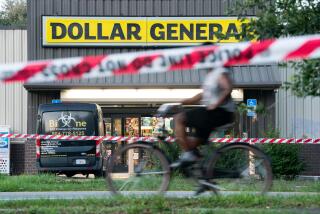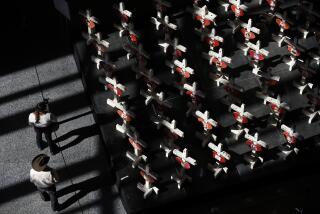Another Peril on the Road: Armed Men
- Share via
BAGHDAD — Saamir Abid Majid knew it was risky to open a little stand selling Pepsi and candy to troops at a U.S. base outside Fallouja. After an Iraqi barber who also worked at the military base was shot while driving home, Majid started carrying a 9-millimeter pistol in his vehicle.
But when the van was ambushed on the highway in March, Majid had no time to react before a barrage of rifle fire hit him from both sides.
His passenger, an Iraqi interpreter who also worked at the U.S. base, died instantly. Majid was hit in the face by a bullet that entered his right cheek, shattered his teeth and palate, and blasted out the other side.
“I managed to open the car door and collapsed on the pavement,” Majid recalled, struggling to speak through a jaw still wired shut. “They left me for dead.”
In a nation beset by kidnappings, carjackings and suicide bombings, shootings of people in vehicles -- most often by gunmen in other cars -- have become one of the most deadly and difficult types of crime to prevent. Car shootings are a security nightmare for government officials, police officers, foreigners and those who work with them.
This week, a top official of Iraq’s largest Shiite Muslim party was shot to death in his car on his way to work in Baghdad. Shahir Faisal Shahir was a senior advisor to the Supreme Council for Islamic Revolution in Iraq and a senior commander of the party’s Badr Brigade militia.
In late May, Salama Khafaji, a member of the just-disbanded Iraqi Governing Council, narrowly escaped an assassination attempt as she traveled the road from Najaf to Baghdad. Her son and one bodyguard were killed when gunmen in a car opened fire on their convoy.
Earlier in May, two Russian electricity experts were gunned down while driving to work in Baghdad, and a police captain and a university student were shot on the road to Baqubah. In addition, a British civilian contractor was shot and killed while driving between the northern cities of Mosul and Irbil, and a Polish journalist was ambushed in a nondescript family car south of Baghdad.
One of the grisliest attacks came March 31, when a convoy carrying four American security contractors was fired on from the street as it drove through a busy commercial district in Fallouja. Mobs descended upon the vehicles after the ambush, mutilating the bodies and dragging at least one behind a car.
The Fallouja attack came at the end of a month of nearly a dozen deadly car-on-car shootings around Iraq.
* In Mosul, four American missionaries and two foreign security guards were killed and the Iraqi public works minister narrowly survived an assassination attempt.
* In Baghdad, two Finnish businessmen were shot in an underpass and an Iraqi interpreter for Time magazine was killed on his way to work.
* South of the capital, in Hillah, nine Iraqi police officers and trainees were killed in a vehicle that came under fire.
* Two American staffers of the U.S.-led Coalition Provisional Authority and two foreign contractors died in separate drive-by attacks.
“It’s something that escalates with the political situation,” said Brig. Gen. Raad Yass, head of the major crimes unit of the Iraqi police.
Those most at risk have taken additional security measures: changing their usual routes, having their cars armored and attempting to keep a low profile.
Abdul Hadi, 50, waited months to receive his new Iraqi police uniform. Now he’s afraid to wear it when he’s not at work. He carries the uniform in a bag and changes when he arrives at work to avoid being seen on the streets in the distinctive blue shirt.
“It’s better this way,” Hadi said.
A newswire bureau chief in Baghdad sold all the agency’s GMC sport utility vehicles and replaced them with used cars.
“The GMC is a target because it is the car used by the coalition,” said the journalist, who asked not to be identified for security reasons.
One Iraqi businessman said he tried to drive a different car each day to confuse potential attackers, sometimes trading vehicles with others who feel they also are at risk. One journalist removed the satellite antenna from his car to appear “less important.” Others now travel only when necessary.
Some foreigners traveling by car have begun wearing traditional Middle Eastern head coverings to look more like locals.
Sales of armored cars in Iraq have boomed. A body shop that once fixed cars for the regime of Saddam Hussein is importing and retrofitting armored cars. Despite price tags as high as $150,000 and no guarantees that the armor will stop all bullets, the manager has sold scores of them to Iraqi government officials, private security firms and Western media outlets.
“We will be selling these kinds of cars for the next five years,” the manager said.
Many of the car shootings appear to be designed to terrorize foreigners. Those working with Americans -- particularly Iraqi drivers, security guards and interpreters -- also have been victimized, possibly by former Baath Party members who consider such Iraqis to be collaborators with the U.S.-led occupation, officials said.
U.S. officials said they believed that some of the attacks were planned and others were crimes of opportunity.
“It’s our analysis up to this point that these have been local-type operations, not something that is being orchestrated on a grand scale,” U.S. military spokesman Brig. Gen. Mark Kimmitt said.
The shootings from cars have taken a heavy toll on Iraqi police, who also have been targeted by suicide bombers.
Each morning before he drives to work, Lt. Col. Salman Abdul Kareem looks underneath his car for anything suspicious. Then he calls some of his men to patrol the neighborhood.
“We are always watching for these things, but now we are watching more closely,” he said.
Some of the attacks against police have been carried out by former prison inmates released under an amnesty granted by Hussein before the war, officials said.
When police captured a suspect in the recent shooting of an officer, they discovered that the attacker had previously been arrested by the same officer.
“It turned out to be a matter of revenge,” Kareem said.
Majid said he didn’t know who followed his van that day in Fallouja and opened fire. But he thinks he knows why.
After the shooting, the gunman ransacked Majid’s van. When U.S. soldiers arrived to offer help, they found that someone had taken the interpreter’s military base ID card from his wallet and placed it on his chest as a warning.
“I’m so grateful to the American soldiers,” Majid said.
But he won’t be reopening the snack stand when he recovers. “How can I go back?”
More to Read
Sign up for Essential California
The most important California stories and recommendations in your inbox every morning.
You may occasionally receive promotional content from the Los Angeles Times.













